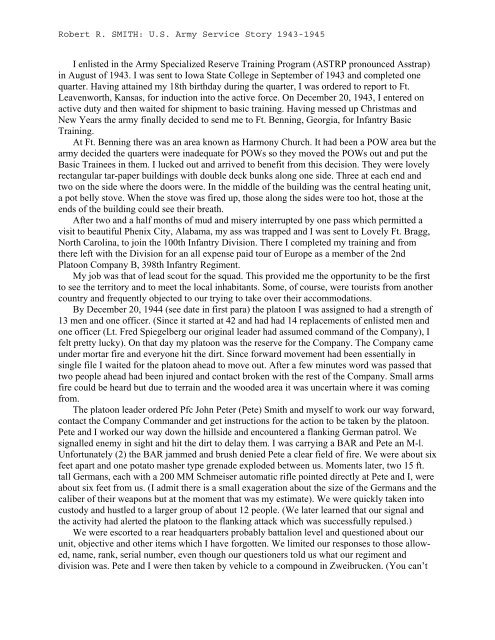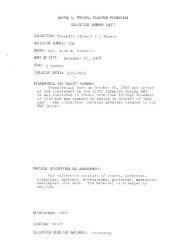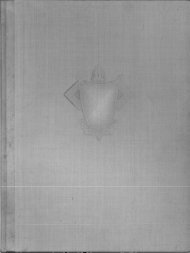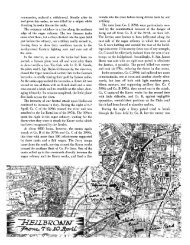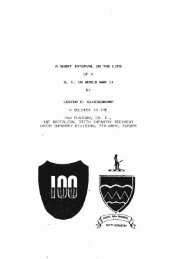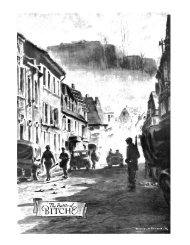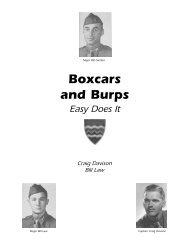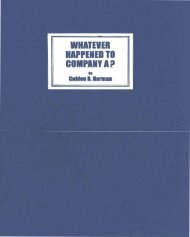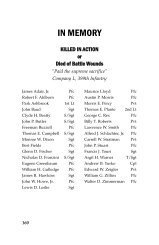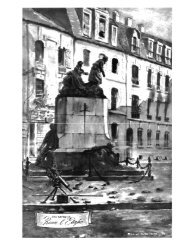Robert R. SMITH: US Army Service Story 1943-1945
Robert R. SMITH: US Army Service Story 1943-1945
Robert R. SMITH: US Army Service Story 1943-1945
You also want an ePaper? Increase the reach of your titles
YUMPU automatically turns print PDFs into web optimized ePapers that Google loves.
<strong>Robert</strong> R. <strong>SMITH</strong>: U.S. <strong>Army</strong> <strong>Service</strong> <strong>Story</strong> <strong>1943</strong>-<strong>1945</strong><br />
I enlisted in the <strong>Army</strong> Specialized Reserve Training Program (ASTRP pronounced Asstrap)<br />
in August of <strong>1943</strong>. I was sent to Iowa State College in September of <strong>1943</strong> and completed one<br />
quarter. Having attained my 18th birthday during the quarter, I was ordered to report to Ft.<br />
Leavenworth, Kansas, for induction into the active force. On December 20, <strong>1943</strong>, I entered on<br />
active duty and then waited for shipment to basic training. Having messed up Christmas and<br />
New Years the army finally decided to send me to Ft. Benning, Georgia, for Infantry Basic<br />
Training.<br />
At Ft. Benning there was an area known as Harmony Church. It had been a POW area but the<br />
army decided the quarters were inadequate for POWs so they moved the POWs out and put the<br />
Basic Trainees in them. I lucked out and arrived to benefit from this decision. They were lovely<br />
rectangular tar-paper buildings with double deck bunks along one side. Three at each end and<br />
two on the side where the doors were. In the middle of the building was the central heating unit,<br />
a pot belly stove. When the stove was fired up, those along the sides were too hot, those at the<br />
ends of the building could see their breath.<br />
After two and a half months of mud and misery interrupted by one pass which permitted a<br />
visit to beautiful Phenix City, Alabama, my ass was trapped and I was sent to Lovely Ft. Bragg,<br />
North Carolina, to join the 100th Infantry Division. There I completed my training and from<br />
there left with the Division for an all expense paid tour of Europe as a member of the 2nd<br />
Platoon Company B, 398th Infantry Regiment.<br />
My job was that of lead scout for the squad. This provided me the opportunity to be the first<br />
to see the territory and to meet the local inhabitants. Some, of course, were tourists from another<br />
country and frequently objected to our trying to take over their accommodations.<br />
By December 20, 1944 (see date in first para) the platoon I was assigned to had a strength of<br />
13 men and one officer. (Since it started at 42 and had had 14 replacements of enlisted men and<br />
one officer (Lt. Fred Spiegelberg our original leader had assumed command of the Company), I<br />
felt pretty lucky). On that day my platoon was the reserve for the Company. The Company came<br />
under mortar fire and everyone hit the dirt. Since forward movement had been essentially in<br />
single file I waited for the platoon ahead to move out. After a few minutes word was passed that<br />
two people ahead had been injured and contact broken with the rest of the Company. Small arms<br />
fire could be heard but due to terrain and the wooded area it was uncertain where it was coming<br />
from.<br />
The platoon leader ordered Pfc John Peter (Pete) Smith and myself to work our way forward,<br />
contact the Company Commander and get instructions for the action to be taken by the platoon.<br />
Pete and I worked our way down the hillside and encountered a flanking German patrol. We<br />
signalled enemy in sight and hit the dirt to delay them. I was carrying a BAR and Pete an M-l.<br />
Unfortunately (2) the BAR jammed and brush denied Pete a clear field of fire. We were about six<br />
feet apart and one potato masher type grenade exploded between us. Moments later, two 15 ft.<br />
tall Germans, each with a 200 MM Schmeiser automatic rifle pointed directly at Pete and I, were<br />
about six feet from us. (I admit there is a small exageration about the size of the Germans and the<br />
caliber of their weapons but at the moment that was my estimate). We were quickly taken into<br />
custody and hustled to a larger group of about 12 people. (We later learned that our signal and<br />
the activity had alerted the platoon to the flanking attack which was successfully repulsed.)<br />
We were escorted to a rear headquarters probably battalion level and questioned about our<br />
unit, objective and other items which I have forgotten. We limited our responses to those allowed,<br />
name, rank, serial number, even though our questioners told us what our regiment and<br />
division was. Pete and I were then taken by vehicle to a compound in Zweibrucken. (You can’t
<strong>Robert</strong> R. <strong>SMITH</strong>: U.S. <strong>Army</strong> <strong>Service</strong> <strong>Story</strong> <strong>1943</strong>-<strong>1945</strong><br />
find the city if you look on a French map or travel in France because they refer to it as Du Ponts<br />
or two bridges).<br />
The building in the holding compound in Zweibrucken was a prefabricated type and the floor<br />
supports had collapsed. It was unheated and had no beds. We slept on the floor, along with<br />
several other American POWs. Food consisted of rye bread, which the first day seemed inedible,<br />
the second day could be tolerated, and by the fifth day was looked forward to like mom’s apple<br />
pie.<br />
Christmas and New Year’s day were spent in Zweibrucken. Little as I enjoyed Christmas and<br />
New Years at Ft. Leavenworth, I must say I liked them even less at Zweibrucken.<br />
On what I would now estimate to be the fourth or fifth of January, <strong>1945</strong>, the group gathered<br />
Zweibrucken(about 75 prisoners) and were marched to Kaiserslautern. The Air Corps had<br />
recently bombed the area which upset the local citizenry. They displayed their anger by spitting<br />
on us and throwing an occasional rock.<br />
At Kaiserslautern we were put aboard the German <strong>Army</strong> version of the Orient Express. The<br />
cars were of the classic 40 et 8 type. I would estimate that we actually had about 35 men in our<br />
car. Sanitary facilities consisted of a bucket in one corner. No seats, blankets or other comforts<br />
were available. The train stopped twice daily and we were allowed out once a day. A piece of<br />
bread was provided at one stop and usually a thin soup at the other.<br />
After three days we arrived at Villingen and were in our first regular prison camp or Stalag.<br />
The accommodations were somewhat less than first class but better than Zweibrucken.<br />
There were three levels of shelves which occupied three of the four walls. The shelves were<br />
approximately 6 1/2 ft wide and about 3 ft between levels.<br />
Front view of room<br />
End or side view
<strong>Robert</strong> R. <strong>SMITH</strong>: U.S. <strong>Army</strong> <strong>Service</strong> <strong>Story</strong> <strong>1943</strong>-<strong>1945</strong><br />
We had food delivered to our room twice a day. There were about 70 men in the room which<br />
was probably 20 ft by 30 ft. The food consisted of a thin soup (small amounts of solids), a potato<br />
and some bread (always a heavy rye bread). We were allowed outside to go to the latrine three<br />
times a day and to exercise once a day.<br />
Each person had one thin blanket and there were no pillows. From the time we were captured<br />
to the time we left Villingen no shower or laundry facilities were provided. As you can well<br />
imagine the group was a little gamy.<br />
In other parts of the Stalag there were British and Russian prisoners. On one occasion the<br />
Russians refused to come out for head count and a dog was sent in to force them out. The dog<br />
was killed and thrown out. We could only see other prisoners. There was no intercamp<br />
communication.<br />
We were moved from Villingen (near the Swiss border) to Stalag Ill-A at Luckenwalde,<br />
Germany (about 40 mi. south of Berlin). The Germans used the same travel agent for this leg of<br />
the trip as they had the previous one so we had the same luxurious travel facilities as before.<br />
Luckenwalde was a more established prison camp than the others. Beds were wooden double<br />
deck bunks. Wooden slats rising slightly at one end provided support. Straw filled burlap pads<br />
were the mattresses and each person had a blanket.<br />
I would estimate that there were about 120 bunks in the room we were in. As mentioned<br />
before the bunks were double deck in groups of six. Three in length and two wide with common<br />
posts providing the support at the head and foot of each bunk and a board down the center<br />
dividing the bunks.<br />
As part of our welcome we were deloused, permitted to shower and issued an overcoat and a<br />
warm, billed cap. It was a Belgian <strong>Army</strong> great-coat but quite warm. All of our clothing was<br />
stamped with a black triangle and the letters KGF (for Kriegs Gefangnen or War Prisoner).<br />
Food was slightly improved. In addition to the 200 grams of bread per day we had either<br />
soup or a boiled potato. Once a week each prisoner would gat a pat of margarine, a teaspoon of<br />
sugar and occasionally a slice of salami or some other sausage.<br />
Heat was provided by a ceramic stove in the center of the room. The Germans provided<br />
enough wood to burn about three hours per day. A few bed slats were burned but they were<br />
irreplaceable so not many went into the fire.<br />
About a month after arriving at Luckenwalde we were again to go to another location. We<br />
were told we were to go to Magdeburg. We heard later that those who did go there wound up<br />
working in a brickyard.<br />
Our travel agent must have been on vacation so instead of a train the Germans invited us to<br />
hike to Magdeburg. We marched from about 9:00 a.m. until dusk. We came to a very small<br />
village as it was getting dark. As with many small villages it was about 3 blocks long and a block<br />
wide. I stepped out of the outside file onto the sidewalk and no one said anything. I got back in<br />
ranks and said to Pete, “Let’s get out of here”. We both got on the sidewalk and when we came<br />
to a corner turned and the rest of the group marched on ahead. We hurried up the road and out of<br />
the village in the darkness. As we scurried away from the village we could hear shouts of “zwei<br />
mannen” (two men). Our absence had been discovered but neither of us were aware of any<br />
search effort. We continued on for what I would estimate to be two miles and found a machine<br />
storage building. It was the only building around and had a storage loft. We broke into the building<br />
and spent the night there. The next day we developed phase two of our carefully planned<br />
escape. We decided we would go east and meet the Russians because they were probably closer<br />
than the American forces. Bear in mind we had no compass, no maps and actually no idea where
<strong>Robert</strong> R. <strong>SMITH</strong>: U.S. <strong>Army</strong> <strong>Service</strong> <strong>Story</strong> <strong>1943</strong>-<strong>1945</strong><br />
we were. While planning this clever strategy we ate the rations that had been provided for the<br />
trip to Magdeburg.<br />
That evening we started for the eastern front. There were no stars and of course the<br />
countryside was blacked out. We got on a roadway and started walking. After what I would<br />
guess was two hours someone said “Halt”! It wasn’t Pete or I.<br />
We decided that we would comply with the strangers request. He flashed a light on us and<br />
called for assistance (Corporal of the Guard, Post 4?) When the others arrived we saw they had<br />
black uniforms with lightning bolts on the collars. Lucky us. We had walked to the entry of an<br />
SS training camp.<br />
We were searched, questioned extensively and fed. The SS troops thought it hilarious that we<br />
had so easily escaped from the Wehrmacht. That probably worked in our favor. We were asked<br />
about treatment in the prison camps and told our story. The camp commandant said “You should<br />
be better cared for than you have described. Someone in authority should be made aware of<br />
conditions”. He placed a call to Berlin and made an appointment for Pete and I to tell our story.<br />
The next day we went in the back of a covered truck to Berlin. A Dutch member of the SS<br />
who spoke excellent English was our guard. His mother had had to leave Amsterdam because of<br />
his status and had an apartment in Berlin. He said if we would agree not to escape we could stay<br />
with him at his mother’s apartment that night. We quickly agreed and proceeded to the apartment.<br />
That night was a social event; son home for a day from the service, friends came to the<br />
apartment, refreshments served and records played. Most memorable and still a nostalgic favorite<br />
-Duke Ellington’s “Mood Indigo”. Twice the evening was interrupted by air raids. We would go<br />
to the basement of the building and in maybe half an hour go back to the apartment.<br />
The next morning we toured Berlin via the subway with our guard. In the afternoon Pete and<br />
I spoke to a Colonel in the German army. Each of us was interviewed alone. After I had<br />
complained about conditions and lack of Red Cross packages I was told that our rations were the<br />
same as German civilian-s received and that Red Cross packages would be distributed if the<br />
Allies would stop bombing the railroads. At the close of the interview he offered me a<br />
Chesterfield cigarette (from a Red Cross package).<br />
The Colonel told our guard that we should not stay in civilian quarters. Arrangements were<br />
made for us to be locked in a cell in a jail in Berlin. On the following day we went by train back<br />
to the area of the SS camp to await return to Wehrmacht control. We had dinner with the camp<br />
Commandant one day (horse meat though we didn’t know it before eating. The animal had been<br />
killed by Allied aircraft and meat salvaged for human use.)<br />
After three days we returned under guard to Luckenwalde and Stalag III-A. For escaping we<br />
were sentenced to 6 days confinement on bread and water. There was a compound within the<br />
camp which was essentially a jail. Two-man cells with barred doors and windows. Between cells<br />
were ceramic stoves to heat the building.<br />
The jail was operated by French prisoners. They would sneak us soup and potatoes so we ate<br />
better than in the regular camp. Another prisoner in the jail was an English soldier. He gave us a<br />
tin of bully beef which was delicious. He had obtained it from a British Red Cross package. He<br />
was awaiting transfer to a criminal prison for assaulting a German civilian. He had been on a<br />
work detail supervised by the civilian. The civilian had left a camera on the seat of a horse drawn<br />
wagon being used in their work. The Englishman took the camera, when the superivsor was<br />
away from the wagon and threw it in a ditch. When the civilian noticed the camera was missing<br />
he accused the English soldier of stealing it. This irritated the soldier who told us: “I’m an honest
<strong>Robert</strong> R. <strong>SMITH</strong>: U.S. <strong>Army</strong> <strong>Service</strong> <strong>Story</strong> <strong>1943</strong>-<strong>1945</strong><br />
man. I’d never steal anything. Destroy something that belongs to a Kraut, yes, steal, no. So I<br />
stomped him”.<br />
After six days we were put back in the regular prison camp compound. All of the prisoners<br />
were new to Stalag III-A having been moved from near the Polish border area due to the Russian<br />
advances. A few days after our return to the regular prison area the first Red Cross packages to<br />
come to Stalag III-A arrived. Pete and I always felt that was partially due to our efforts.<br />
Two weeks after we were back in the regular prison the Germans needed two people to go to<br />
a work camp. There were probably 800 prisoners in Stalag III-A by then but guess who was<br />
chosen. Another reward for escaping.<br />
We were sent to a place called Juterbog. It was a warehouse area about 35 miles south of<br />
Luckenwalde. The warehouse area was for foods of various kinds. Our living area was a<br />
compound within the warehouse area surrounded by a fence about eight feet high and topped<br />
with barbed wire.<br />
The first assignment Pete and I had after being sent to Juterbog was to clean a warehouse that<br />
was used to store root crops (beets, carrots, etc). There were still some bagged onions in the<br />
warehouse. We put one bag of onions in the wheelbarrow we were using to haul out the dirt and<br />
covered the bag with dirt. We took our wheelbarrow near the prison compound fence to empty it<br />
and left the onions hidden by the dirt from the warehouse. On the way back to the warehouse the<br />
wheelbarrow broke and we were unable to finish our job. We sincerely regretted the fact that the<br />
wheelbarrow broke.<br />
There were about 75 Americans at the Juterbog Arbeitskomand (work camp). The onions<br />
became valuable trading material with the other prisoners who had access to other items. Carrots,<br />
salami, potatoes were smuggled in by the prisoners.<br />
We also snacked during the day when possible. One warehouse had canned meats. I had a<br />
“ten in one” can opener on my dog tag chain and could open cans very neatly. Pete and I would<br />
take a few bites, put the can back on the shelf and go about our business. All prisoners were<br />
searched several times looking for a can opener but it was never found.<br />
Pete and I were usually supervised by a civilian named Herman. Herman was not terribly<br />
anxious to work or get much done so I found it more interesting to try to learn some German by<br />
talking to Herman than I did to work. I was able after a month to carry on a limited conversation.<br />
On a few occasions we were taken outside the warehouse area to load bales of straw on<br />
wagons to be brought to the warehouse rail head for loading. The straw was used for bedding for<br />
horses which were still extensively used by the German army on the eastern front. There was a<br />
civilian foreman who supervised those activities who was very unpleasant. His temper was not<br />
greatly improved when we nearly succeeded in knocking him off the wagon with a bale of straw<br />
rolled from the topmost part of the stack to the wagon.<br />
While on one of our straw hauling days I did two things which could have caused serious<br />
problems. First, I tried to catch a chicken and that upset our armed guard. I think he must have<br />
been a bottom of the barrel troop but he did have a rifle. We had a brief unpleasant discussion<br />
about the quality of American versus German troops and I told him I could leave the area if I<br />
wanted. He had his rifle slung over his shoulder and to show him I could leave, I grabbed the<br />
rifle and took it away. It immediately dawned on me that it was a dumb thing to do, so I handed<br />
it right back and turned away. He shouted a lot but must have realized he had a problem if he had<br />
to tell why he shot a prisoner who was not escaping.<br />
The Germans had some boxes of cookies stored in one of the warehouses in a locked room.<br />
We found out the lock could be removed and decided to steal a box. On our first attempt a
<strong>Robert</strong> R. <strong>SMITH</strong>: U.S. <strong>Army</strong> <strong>Service</strong> <strong>Story</strong> <strong>1943</strong>-<strong>1945</strong><br />
German civilian interrupted us as we were about to leave. Pete started berating the guy loudly in<br />
English and we both walked out like he was the interloper. Later in the afternoon we succeeded<br />
in stealing a box of cookies and hiding them in a hay barn. Almost every night we were taken out<br />
of our building due to air raids in the area. We went to trenches near the hay barn and could get<br />
some of the cookies while out. We were searched every evening after work but not on the return<br />
from the air raid shelter.<br />
We also received another Red Cross package while at Juterbog and Pete was selected to work<br />
in the bakery. Life was improving. With our rations, Red Cross packages and with what we<br />
could steal we were no longer constantly hungry.<br />
On the evening of April 22, <strong>1945</strong>, we could hear either artillery fire or bombs exploding in<br />
the distance. There were several low level passes by aircraft with Russian markings that day. On<br />
April 23 our guards told us we were going to go to Bavaria and marched us out of the warehouse<br />
area. We could see preparations being made to destroy it.<br />
We marched for three days. Toward the end of April 25th the guards said “The Americans<br />
are about two kilometers ahead. Go to them”. Pete and I were assisting another prisoner who had<br />
badly blistered feet and bringing up the rear. An American GI came up on a motorcycle and said<br />
“Where the hell have you guys been?” We were back in American hands. This occurred near<br />
Halle, Germany.<br />
During the time we were prisoners neither Pete’s parents or mine knew what had happened to<br />
us. We were listed as missing in action until returned to U.S. control. The 100th Infantry Division’s<br />
“The <strong>Story</strong> of the Century” still has us listed as missing in action.<br />
I am sure that no period of four months in my life has ever had so much impact as the time I<br />
was a POW. Daily I am affected by it. John Peter (Pete) Smith is my closest friend. I met my<br />
wife when on a special leave period afforded Ex-POWs. My discharge date was determined by<br />
the fact that I was a POW. As an Ex-POW I get some added V. A. benefits which I very much<br />
appreciate.<br />
One final benefit. My own personal favorite bureaucratic story. (I spent 28 years as a<br />
bureaucrat). In 1948 the Congress decided that since POWs had not been fed by the <strong>Army</strong> during<br />
their period of imprisonment they should be given $1.00 per day for the days they were POWs.<br />
Each former POW was sent a form which asked “Date captured; date released. Did you escape?<br />
Date of escapes.” I reported the escape and they deducted $2.00 for the days I was free. A year<br />
later the Congress decided that if an individual was a prisoner for 60 or more days it was prima<br />
facie evidence that he had been mistreated and the imprisoning nation should pay him $1.00 per<br />
day. Result: $2.00 was deducted from my entitlement. Final result: Escaping cost me $4.00.
<strong>Robert</strong> R. <strong>SMITH</strong>: U.S. <strong>Army</strong> <strong>Service</strong> <strong>Story</strong> <strong>1943</strong>-<strong>1945</strong><br />
Added note: The story of the $2.00 deduction doesn’t end here. Dad re-told this part of<br />
the story at a POW award ceremony in Sacramento at Congressman Doug Ose’s congressional<br />
district office. After hearing Dad’s story, Congressman Ose dug into his pocket, pulled out<br />
$2.00, handed the money to Dad and said he was sorry it took so long, but here’s the money we<br />
owe you. It was a light-hearted moment and everyone there shared in a laugh.


